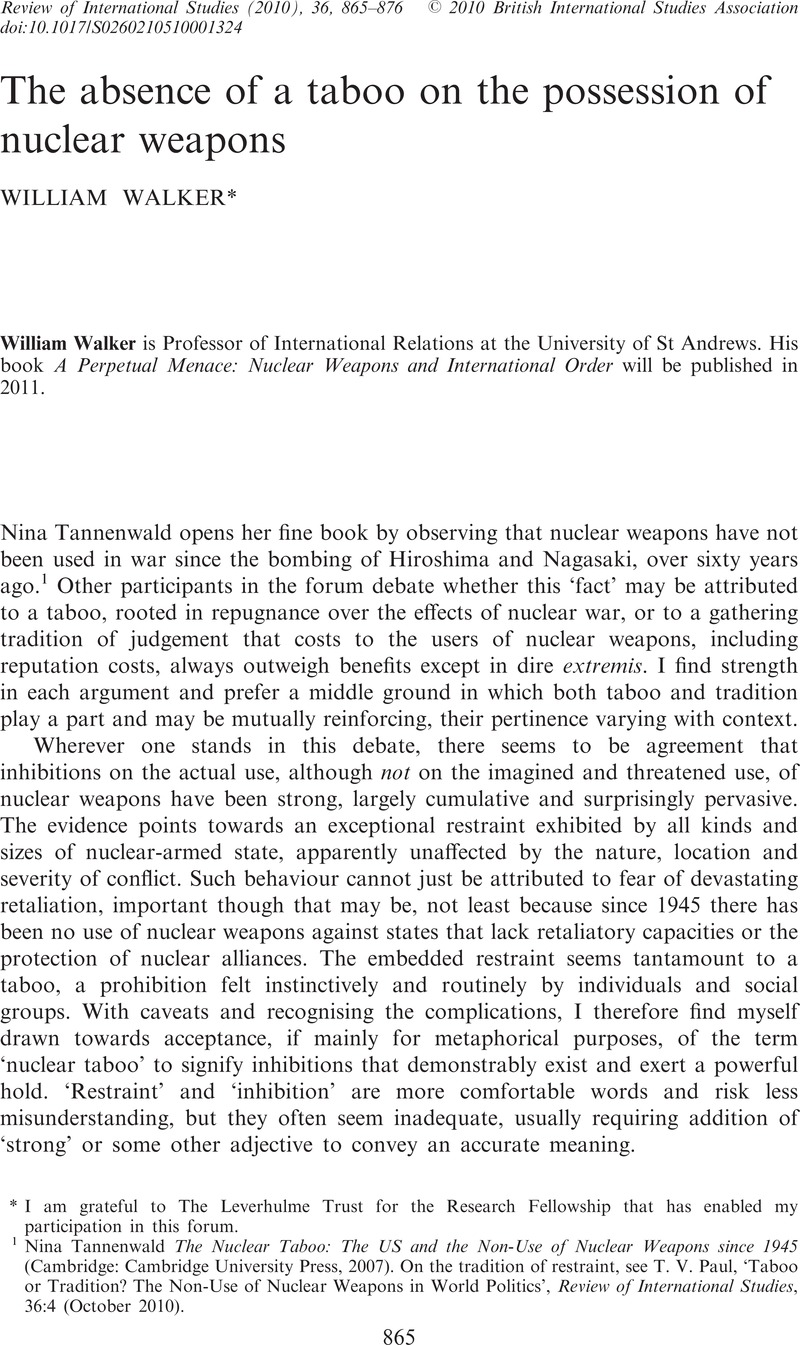Published online by Cambridge University Press: 01 November 2010

1 Tannenwald, Nina The Nuclear Taboo: The US and the Non-Use of Nuclear Weapons since 1945 (Cambridge: Cambridge University Press, 2007)CrossRefGoogle Scholar . On the tradition of restraint, see Paul, T. V., ‘Taboo or Tradition? The Non-Use of Nuclear Weapons in World Politics’, Review of International Studies, 36:4 (October 2010)CrossRefGoogle Scholar .
2 She addresses some aspects of possession in chap. 9 of The Nuclear Taboo, ‘The taboo in the post-Cold War world’.
3 An influential if confused contribution to the limited war debate was Kissinger, Henry, Nuclear Weapons and Foreign Policy (New York: Harper Brothers, 1957)Google Scholar . For a discussion of more recent American dabbling in ideas of limited nuclear war in the Nuclear Posture Review and elsewhere, see Theo Farrell's contribution to the forum.
4 Nina Tannenwald, The Nuclear Taboo, op. cit., chap. 6, ‘Nuclear weapons and the Vietnam War’.
5 Kenneth Waltz, ‘The Spread of Nuclear Weapons: More May Be Better’, Adelphi Paper No. 171 (London: International Institute for Strategic Studies, 1981).
6 The quotation comes from Tannenwald, Nina, The Nuclear Taboo, op. cit., p. 381Google Scholar .
7 A Report on the International Control of Atomic Energy (the Acheson-Lilienthal Report) prepared for the Secretary of State's Committee on Atomic Energy, US Government Printing Office, Washington, DC (16 March 1946).
8 Report of the Canberra Commission on the Elimination of Nuclear Weapons, Canberra (August 1996).
9 For a very early discussion of the UN's role in this regard, see Corbett, Percy E., ‘Effect on International Organisation’, in Brodie, Bernard (ed.), The Absolute Weapon: Atomic Power and World Order (New York: Harcourt, Brace and Company, 1946)Google Scholar .
10 I am grateful to an anonymous reviewer for the ending of this sentence (I had originally ended it with ‘… reliance on taboos’). The reviewer justified her or his expansion on grounds that ‘the overall taboo surely consists of a combination of coercive, reciprocal (including verified) and normative elements, as claimed in realist, rational and constructivist theoretical accounts respectively of why actors like states might comply with international norms’.
11 It is traditional in the UK for the incoming Prime Minister to write a letter to submarine commanders instructing them whether or not to launch nuclear missiles if the political centre is ‘decapitated’. The letter is private and sealed and its contents are not discussed with any other person.
12 Kaldor, Mary, The Imaginary War: Understanding the Eest-West Conflict (London: Basil Blackwell, 1990)Google Scholar .
13 ‘We have gone on piling weapon upon weapon, missile upon missile, new levels of destructiveness upon old ones. We have done this helplessly, almost involuntarily: like the victims of some sort of hypnotism, like men in a dream, like lemmings heading for the sea […] we and the Russians together [have achieved] levels of redundancy of such grotesque dimensions as to defy rational understanding.’ Kennan, George F., The Nuclear Delusion: Soviet-American Relations in the Atomic Age (London: Hamish Hamilton, 1984), p. 176Google Scholar .
14 Lebow, Richard Ned, The Tragic Vision of Politics: Ethics, Interests and Orders (Cambridge: Cambridge University Press, 2003), pp. 271–272CrossRefGoogle Scholar .
15 Nick Ritchie, ‘Trident and British Identity: Letting Go of Nuclear Weapons’, Briefing Paper No. 3, Bradford Disarmament Research Centre, University of Bradford (2008), p. 6. It is interesting that the government's public justification for replacement was framed entirely in security terms. There appears to have been a deliberate decision to discourage public discussion of the deeper reasons out of concern that they would undermine the case's legitimacy at home and abroad.
16 This is discussed in Perkovich, George, India's Nuclear Bomb (Berkeley: University of California Press, 1999)Google Scholar .
17 For a discussion of the trend among terrorist groups towards mass violence, see Hoffman, Bruce, Inside Terrorism, revised and expanded edition (New York: Columbia University Press, 2006)Google Scholar .
18 Tannenwald, Nina, The Nuclear Taboo, op. cit., p. 382Google Scholar .
19 Shultz, George, Perry, William, Kissinger, Henry and Nunn, Sam, ‘A World Free of Nuclear Weapons’, The Wall Street Journal (4 January 2007)Google Scholar .
20 Carter, Ashton B. and Perry, William J., Preventive Defense: A New Security Strategy for America (Washington, DC: Brookings Institution Press, 1999), p. 152Google Scholar .
21 Schell, Jonathan, The Abolition (London: Jonathan Cape, 1984), p. 5Google Scholar .
22 The role of shocks and surprises in bringing about change in outlooks and policies is under-theorised. A particularly interesting discussion in another context is Harvey Brooks, ‘The typology of surprises in technology, institutions and development’, in Clark, W. C. and Munn, R. E. (eds), Sustainable Development in the Biosphere (Cambridge: Cambridge University Press, 1987)Google Scholar .
23 Article VI and its elaboration in NPT Conference decisions essentially commit nuclear weapon States Parties to achieve the abolition of nuclear weapons in return for other Parties’ permanent renunciation of rights to possess them.
24 I have written about this in, among other places, ‘Weapons of Mass Destruction and International Order’, Adelphi Paper No. 370 (London: International Institute of Strategic Studies, 2004).
25 Cohen, Avner, Israel and the Bomb (New York: Columbia University Press, 1998)Google Scholar . Israel did however send signals that it was considering the use of nuclear weapons in 1974 when its back was to the wall during the Yom Kippur War, ostensibly to encourage US intervention to constrain its opponents.
26 In the case of Tammuz, Israel took care to act before the reactor began operating in order to avoid the serious costs to its reputation arising from radiation deaths and injuries and from attacking an internationally safeguarded facility. Under the then current rules of IAEA safeguards, the reactor would come under inspection only after fissile material had been inserted.
27 Nina Tannenwald, The Nuclear Taboo, op. cit.